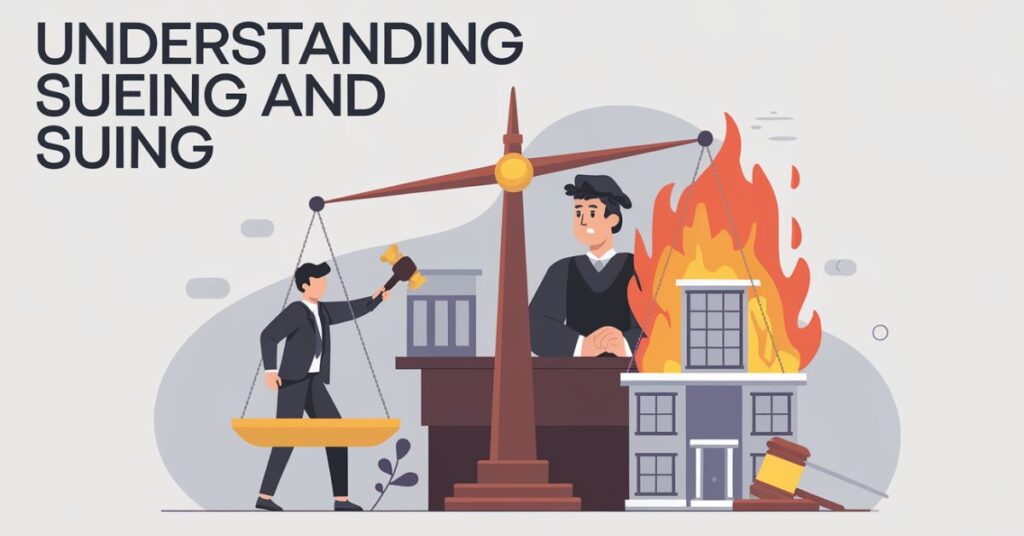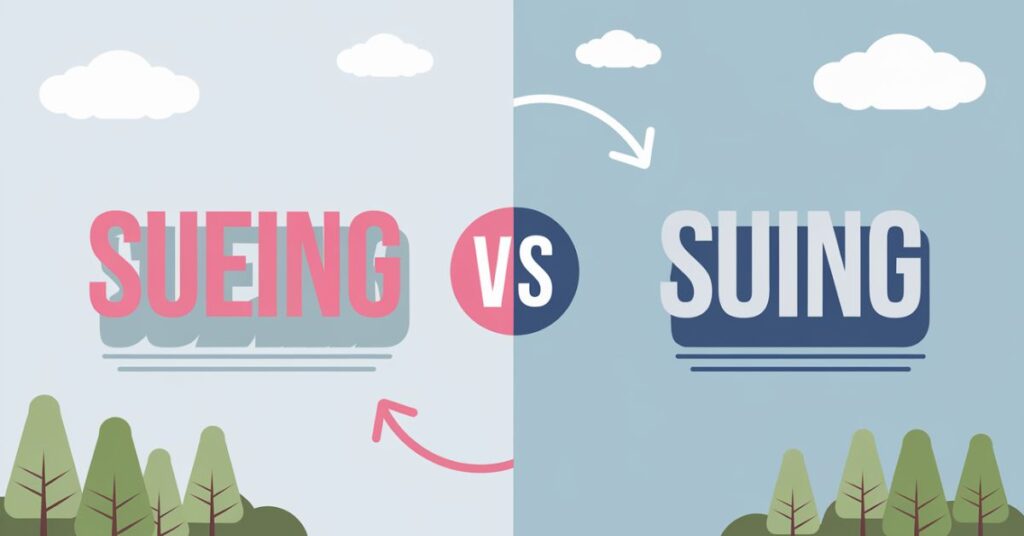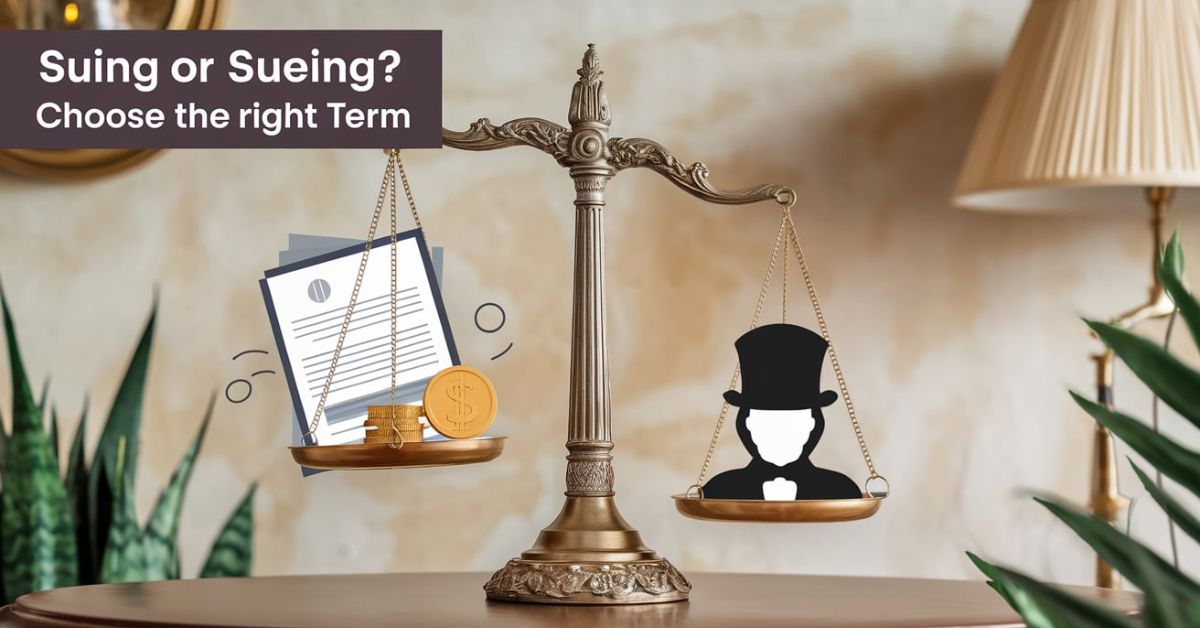Sueing or Suing refers to the act of taking legal action against someone. While suing is the correct term, many mistakenly use sueing. This small spelling mistake can lead to confusion in legal contexts.
Have you ever wondered if you’re using the right term when discussing legal matters? Many people mix up sueing and suing, but it’s important to know the difference. Using the wrong term could make your communication seem unprofessional.
Understanding the correct term can help avoid misunderstandings. Suing is the proper way to describe bringing a lawsuit in court. If you use sueing, it’s considered a misspelling, and it’s best to stick with suing in all legal discussions.
Quick summary
This article clears up the confusion between “sueing” and “suing.” While suing is the correct term for taking legal action, sueing is a common misspelling. Using the right term is crucial in legal contexts to maintain professionalism. By understanding the difference, you can communicate more effectively in legal matters.
Understanding Sueing and Suing

Before we get into the nitty-gritty details, let’s take a moment to clear up the confusion between sueing and suing. While they may appear to be interchangeable at first glance, the two terms are not the same, and understanding their correct usage is important, especially when communicating in legal contexts.
Sueing: A Misspelling, Not a Valid Word
The term “sueing” is a misspelling. It’s a common mistake, but it’s important to note that this is an incorrect word in legal terms. In formal writing, particularly in legal documents, using sueing can undermine your professionalism. It’s not just a typographical mistake it’s a misunderstanding of legal terminology. The correct spelling is “suing.” So, whether you’re discussing lawsuits or legal actions, always use “suing”.
Suing: The Correct Term in Legal Contexts
On the other hand, “suing” is the correct term and the one you should use in all legal contexts. Suing refers to the act of bringing a lawsuit against someone in a court of law. It’s the process of seeking legal action, often to resolve disputes, seek compensation, or hold someone accountable for a wrongdoing. For example, if you’re the victim of a breach of contract, you might consider suing the other party involved to claim damages or compensation.
Suing is the official term used by legal professionals, and it’s recognized in all legal proceedings, including court cases, lawsuits, and litigation. It’s crucial to get this term right, as it helps convey the seriousness and formality of the action being discussed.
Sueing: Definition and Usage
As mentioned earlier, sueing is a misspelling that you’ll want to avoid in all legal writing. While it may seem like a minor error, using this incorrect spelling could confuse others or make you appear less credible in a professional or legal context. Here’s a deeper look at why this is important:
Why Is “Sueing” Incorrect?
- Non-standard Usage: Sueing doesn’t exist in the dictionary as a correct spelling for this legal action. The proper term is “suing”.
- Legal Confusion: In professional communication and legal documentation, precision matters. Using the wrong word can lead to misunderstandings about your case or legal standing.
- Impact on Professional Image: Mistakes in legal terminology, such as sueing instead of suing, can affect how others perceive your understanding of legal concepts, especially in court.
5 Synonyms for “Sueing” (Incorrectly Used)
Although “sueing” is not the correct term, here are a few synonyms that people might incorrectly associate with sueing. Keep in mind that these terms are more appropriate in a non-legal context but can still cause confusion when misapplied in legal discussions:
- Lawsuit (incorrectly used as a verb)
- Claim
- Legal action
- Court case
- Litigation
Suing: Definition and Usage
Now, let’s take a closer look at suing, the correct and proper term used in all legal settings. When you’re talking about filing a lawsuit or taking legal action, suing is the term you should use.
What Does Suing Mean?
Suing refers to the act of initiating a formal legal action, typically in the form of a lawsuit, against another party. This is done in an effort to seek redress, resolve disputes, or claim damages. In a lawsuit, the person who files the case is the plaintiff, and the person being sued is the defendant.
For example, a person may sue for damages after a car accident or to resolve a breach of contract between two business parties. In all of these cases, the individual taking legal action is suing the other party in court.
5 Synonyms for “Suing”
In legal contexts, you’ll encounter several synonyms for suing. These terms all refer to the broader process of legal action, and understanding their specific uses can be helpful:
- Filing a lawsuit
- Taking legal action
- Litigating
- Pursuing a claim
- Seeking compensation
Side-by-Side Comparison: Sueing vs. Suing

To further clarify the difference between sueing and suing, let’s break down the key aspects of each term in the table below:
| Aspect | Sueing | Suing |
|---|---|---|
| Definition | A misspelling of the correct term. | The act of filing a lawsuit or taking legal action. |
| Usage | Incorrect and non-standard. | Correct term for legal contexts. |
| Legal Implications | Using sueing undermines legal authority. | Suing is recognized in all formal legal contexts. |
| Example Sentence | “He’s sueing the company.” | “He’s suing the company for breach of contract.” |
| Synonyms | Lawsuit, Claim (misused) | Legal action, Litigation, Court case |
As shown in the table, sueing is not acceptable in any professional or legal setting. Suing, however, is the appropriate and widely accepted term.
Why Does It Matter?
You might be wondering: does it really matter whether you use sueing or suing? The answer is a resounding yes.
Importance in Professional Communication
In legal contexts, the accuracy of your language can make a significant difference. Whether you’re drafting a formal document or speaking with legal professionals, using the right terms is crucial. Legal terms such as suing help convey seriousness and credibility, while mistakes like sueing can detract from your message and make you seem less informed.
Legal Implications of Using the Wrong Term
Imagine this: You’re filing a lawsuit over a breach of contract. In a conversation with a lawyer, you say you’re “sueing” the company instead of “suing.” While the lawyer may understand what you mean, using incorrect terminology could reduce your professional credibility. It might even create confusion in written documents, especially in formal legal proceedings like court cases or legal claims.
Everyday Usage Examples
Let’s look at some practical examples where these terms might come up in everyday situations. Below are some common scenarios to illustrate how to use the terms suing and sueing correctly.
Incorrect vs. Correct Examples:
- Incorrect: “After the breach of contract, they are sueing for compensation.”
- Correct: “After the breach of contract, they are suing for compensation.”
- Incorrect: “The plaintiff is sueing the defendant for damages.”
- Correct: “The plaintiff is suing the defendant for damages.”
These examples highlight just how important it is to use the correct legal terminology in both written and verbal communication.
FAQs: Sueing vs. Suing
Is it sueing or suing?
The correct term is suing. Sueing is a misspelling and should not be used in legal contexts.
What does suing mean?
Suing refers to the act of initiating a lawsuit or legal action against someone in order to resolve a dispute or seek damages.
How to pronounce suing?
Suing is pronounced as “soo-ing.”
Is suing a real word?
Yes, suing is a real word, and it’s the correct term to use when referring to legal actions, such as filing a lawsuit.
Why is someone suing?
People file lawsuits or take legal action for a variety of reasons, including breaches of contract, personal injury, unfair dismissal, or seeking compensation for damages caused by others.
Conclusion
Knowing the difference between sueing and suing is more than just a matter of spelling. It’s about using the correct legal terminology to convey professionalism and credibility in legal matters. Whether you’re involved in a legal dispute, considering filing a lawsuit, or simply discussing legal issues, always remember that suing is the correct and widely accepted term.
By avoiding the mistake of using sueing, you demonstrate a strong understanding of legal language and processes. So, the next time you find yourself discussing legal action, make sure you choose the right term. Your credibility and clarity in communication depend on it.
With 5 years of experience in grammar, I, Admin, deliver accurate, clear, and reliable content. My expertise ensures top-quality insights in this niche.

